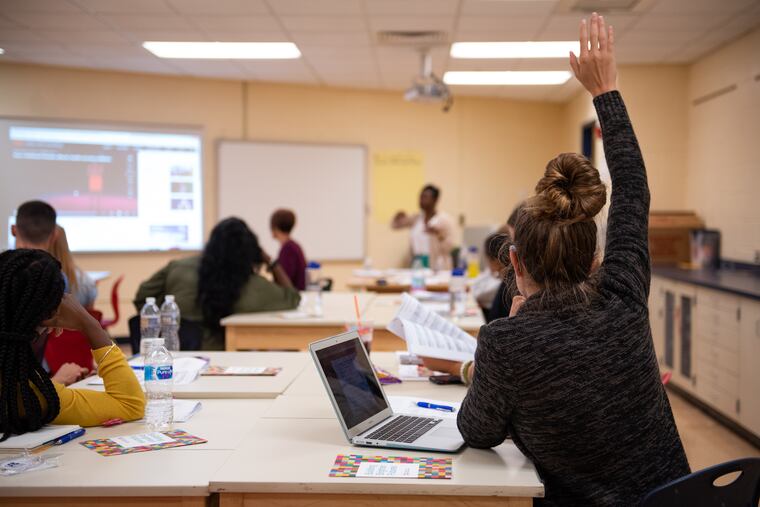‘No one sugar-coated anything:’ Philly teachers undergo intense training to improve empathy and inclusion
"Do not use your own internal bias to dictate how you treat a young person," one trainer told new Philadelphia teachers.

Kaila DeFrancesco is 23, a brand-new educator about to begin her career as a health and physical education teacher at a North Philadelphia elementary school.
She's bright and eager, and in college had exactly zero formal classroom training in recognizing and responding to students affected by trauma — a subject that will surely have an impact on how effective she can be as a teacher.
So when DeFrancesco, who will begin teaching at Meade Elementary this month, sat through a session on that subject during a recent Philadelphia School District teacher-training institute, it felt like a revelation.
"Ninety-five percent of our students experience some form of trauma," said DeFrancesco. "We need to take care of their basic needs before we push ideas and curriculum on them."
In the not-too-distant past, school districts typically gave new teachers a brief and sometimes perfunctory warm-up to the jobs they were jumping into: Here's how you sign up for health insurance, take a handout on classroom management. Increasingly, though, districts are broadening and deepening that training in an effort to better equip educators.
In Philadelphia, part of that effort is a week-long, intensive new-employee institute that featured sessions on trauma-informed care, creating inclusive classrooms, and engaging multilingual families.
Meredith Mehra, the district's deputy chief of teaching and learning, said the aim — sharpened in the last few years — is to provide new teachers real-world tools to tackle a tough job in a massive bureaucracy organized around educating kids with unique challenges. An important part of the training, Mehra said, is the piece around climate, culture, and the things urban kids carry with them to school.
"This is just as important as 'What do I teach and when do I teach it?' or 'When do I get my first paycheck?'" Mehra said. "We have to tackle these conversations, and we can't let our fear of not doing it right or not doing it good enough stop us."
Nationwide, teacher induction programs — some call them "onboarding," a nod to the the business practice of integrating employees into a firm's culture — are on the rise, said Richard Ingersoll, a professor in the University of Pennsylvania Graduate School of Education.
"There's been a recognition that there's a very high quit rate among new teachers," Ingersoll said. "There's been growth nationwide in these induction support programs for beginning teachers."
The quality of such programs is mixed, but even with the best programs, strong training is no panacea. Still, it can move the needle, according to Ingersoll's research on teacher induction.
For the 500 new Philadelphia teachers and counselors who gathered at the Arts Academy at Benjamin Rush for a week of day-long sessions this month, that was the hope of the orientation, which cost the district nearly a half-million dollars.
In one room, staffers from HIAS Pennsylvania, the nonprofit that supports immigrants, and Ludy Soderman, the school system's director of multilingual family support, talked about creating a welcoming classroom for families whose first language is not English.
They gave tips: include welcome signs in languages with which students are familiar, make sure you're pronouncing unfamiliar names properly, never use children as interpreters. Soderman grabbed her cell phone to give a demonstration of a service available to all district staff that offers real-time interpreters in hundreds of languages.
"You have to build bridges between the school and the family," Soderman said.
In another room, Hazel Edwards, an educator with the Attic, a nonprofit that serves LGBT youth, talked about microaggressions and preferred pronouns, running down sobering statistics: LGBT youth report anti-LGBT slurs upward of 50 times per day at school. They sometimes have no supportive adults at home; a teacher or counselor might be their refuge.
"Do not use your own internal bias to dictate how you treat a young person," Edwards said.
Maria Asencio, a staffer with the Children's Crisis Treatment Center, worked with another group of teachers on why some students exhibit chronic misbehavior.
"Children's acting-out behavior often originates in feelings of vulnerability as opposed to willful defiance," Asencio said, giving teachers tools to help kids coping with trauma: breathing exercises, "brain breaks" and other supports.
For the new employees themselves — some veterans coming to Philadelphia from other schools or districts, but many first-time teachers — it felt like a lifeline. No one was under the impression the first year of teaching in Philadelphia would be easy, but many felt better prepared.
Kenneth Freeman, who has worked for the district for a decade as a counselor but is moving over to teach film to students at Pollock Elementary, said he felt energized by the material — from classroom management techniques to more nuanced tips on welcoming diverse students.
"You couldn't pay for the information we got here," Freeman said near the end of orientation. "No one sugar-coated anything; being a teacher is a whole lot harder than I imagined, but I know where I can get help."
Philadelphia Media Network is one of 19 news organizations producing Broke in Philly, a collaborative reporting project on solutions to poverty and the city's push toward economic justice. Follow us at @BrokeInPhilly.